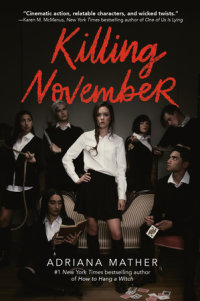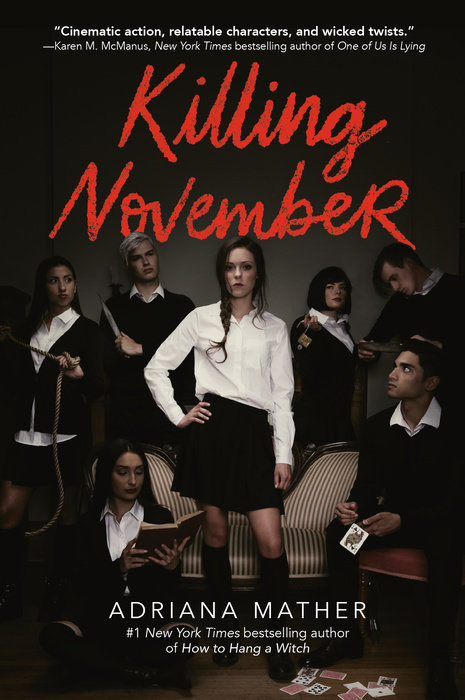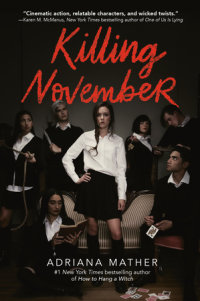My name is November Adley and I was born in August. The way my dad tells it, the Connecticut nights were unusually cool that summer, and the day I arrived our maple burst with color reminiscent of late fall—hence my name. He claims the leaves shone so brightly in the morning sun that it looked like our front lawn was on fire. Dad also says that’s part of the reason I’m obsessed with the woods. I’m not sure there’s any connection, but I enjoy the comfort of that story—a reminder of a time when the world was safe and so was my family.
The most disorienting thing about safety—my own in particular—is that it never crossed my mind before. My ex-CIA, now–financial manager dad often tells me I’m too trusting, all the while shaking his head like he’s shocked that we’re related. Which I, of course, remind him is one hundred percent his fault, since I’ve lived my entire life in the same small town with the same friendly people, who pose about as much…
My name is November Adley and I was born in August. The way my dad tells it, the Connecticut nights were unusually cool that summer, and the day I arrived our maple burst with color reminiscent of late fall—hence my name. He claims the leaves shone so brightly in the morning sun that it looked like our front lawn was on fire. Dad also says that’s part of the reason I’m obsessed with the woods. I’m not sure there’s any connection, but I enjoy the comfort of that story—a reminder of a time when the world was safe and so was my family.
The most disorienting thing about safety—my own in particular—is that it never crossed my mind before. My ex-CIA, now–financial manager dad often tells me I’m too trusting, all the while shaking his head like he’s shocked that we’re related. Which I, of course, remind him is one hundred percent his fault, since I’ve lived my entire life in the same small town with the same friendly people, who pose about as much threat as a basket of sleeping kittens. Dad argues that I want to believe people are good and that while that’s admirable, it’s also not realistic. To which I ask him how it helps anyone to believe that people are bad. He claims that having a healthy sense of suspicion prepares you for every possible danger. But until now, it was all just a theory. And if I’m being honest, even yesterday, with Dad insisting there was an imminent threat to our family, I still wasn’t convinced. Nope, there was absolutely nothing indicative of danger in my life until a few minutes ago, when I woke up in this medieval-looking . . . parlor?
I frown. A man I’m assuming is a guard stands against the wall next to me. He’s staring forward, blatantly ignoring me, as I consider the door. I push as hard as I can on the wrought-iron latch and even throw my shoulder into the dark wood, but it doesn’t budge. I let out a huff from the effort and scan the room. There’s a roaring fire in the fireplace and maroon velvet furniture that probably costs more than my entire house. But there are no windows and the door in front of me is the only exit.
“I know you hear me,” I say to the guard, who so far hasn’t answered a single one of my questions. He’s dressed all in black, with a leather belt and leather armbands that put to shame the Roman gladiator costume I wore last year for Halloween. I toy with the idea of snapping my fingers in front of his face, but he’s a good foot taller than me and his arms are more muscular than my legs.
He remains silent.
I try another angle. “You know I’m a minor, right? That you can’t keep me locked up in this . . . Well, I’m assuming this is my new boarding school. But what kind of a school locks up their students?” Dad told me this place would be different, but I have a hard time believing he meant I’d be trapped in a windowless room.
Just then I hear a key slide into the door and it swings outward. My shoulders drop and my hands unclench. Another guard, dressed identically to the first, gestures for me to follow him. I don’t waste a second. Unfortunately, the room guard comes, too, and walking between them, I feel almost as confined as I did in that room.
The guard in front pulls a lit torch off the gray stone wall and I take inventory of my surroundings—the lack of electricity, the arched ceilings, the heavy wooden doors that use latches instead of knobs. There’s no way I’m still in the United States. This place looks like something out of a documentary I once streamed about medieval Irish castles. However, I find it nearly impossible to believe Dad would send me all the way to Europe, not to mention be able to pay for it. We almost never leave Pembrook, much less the state of Connecticut.
As we continue to walk, I notice impressive hanging tapestries depicting knights, royal courts, and bloody battles. It’s also dead quiet, no sounds of people chatting or cars driving by.
The hall has a distinct chill, and I pull the sleeves of my sweater down over my fingers for warmth. I have no idea what happened to the coat, gloves, and scarf I wore onto the plane; they weren’t in the room with me when I woke up. We pass under an archway and ascend a staircase with worn, uneven stone steps. I count two landings and three flights before we come to a stop in front of a door patterned with iron rivets. The lead guard unlatches it and warm air billows out.
The antiquated office reminds me of a somber scene in a movie about Mary, Queen of Scots. The only light in the room comes from an abundance of candles set in silver candelabras and in sconces on the stone walls. The windows are covered with heavy curtains and a fire blazes inside the fireplace, filling the air with the scent of woodsmoke.
A tall, thin woman stands behind a seemingly ancient desk. Her brown hair is pulled into a high bun so tight that it gives me a headache just looking at it. She’s probably around Dad’s age, but her severity makes her seem older.
She does a poor impression of a smile. “Welcome to Academy Absconditi. I’m Headmaster Blackwood. I trust your trip was agreeable?” Her voice and demeanor command obedience.
“I don’t remember my trip,” I say, feeling uneasy under her gaze as I pull a piece of fuzz off my jeans. The rant I was working up downstairs feels inappropriate in this formal setting. “I passed out on the plane and woke up on a couch in the . . . To be honest, I’m confused how—”
“Teachers’ lounge,” she says, and gestures for me to sit in an armchair in front of her desk. The frills of a white blouse spill out from the edges of her black blazer. The contradiction makes me wonder which one she is—uptight and trying to appear approachable, or soft and trying to look stern. “You were out for some time.”
“I was locked up down there,” I say, expecting shock, but it doesn’t come. I turn and look behind me. Both guards are still with us, one on either side of the now-closed door. Whether they’re protecting her or preventing me from leaving is unclear. Maybe both.



